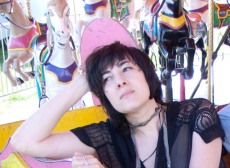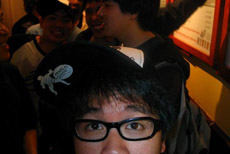how do you translate sound to words and how may those words be recoded back in terms of sound? what gets lost in the process? in what way is one’s interpretation of music accurately translated into a literal, textual form, and how is that eventually decoded by its reader who then tries to picture (as if it’s now a visual thing!) how the music sounds like and whether it’s worth checking out? these are questions every music writer faces, as his or her writing stands in gulf between the musician and the audience. it’s an intriguing chain of interpretation and reinterpretation, a process made even more complicated if you replace the music reader/listener at the end of the line with another musician.
a post-lunch conversation on time led to a mention of the talking heads‘ song “once in a lifetime”, which subsequently prompted me to give my old remain in light (1980) album a relisten. while much of that record is rightly known for its polyrhythmic structure and its pioneering work in bringing a world music vibe to the post-punk movement, the last song “the overload” was conceived as an interpretation of what joy division might have sounded like. none of the members of the band had ever heard the work of joy division, but attempted this song solely based on what they had read in the press on what their music sounded like. i’m sure words like cold, distant and atmospheric must have been most recurrent, judging from the song’s deliberate break from the exotic grooves of the rest of the album.
the result is uncanny: “the overload” loses the band’s distinctive compactness in favor of an ambience spread thin over its 5 minutes, with david byrne‘s vocals inheriting an eerily distant ian curtis drone, reminiscent of deathly ballads like “candidate” from unknown pleasures (1979) or “eternal” from closer (1980). if anything, though, talking heads attempts this mimicry far too well in reconstructing perfectly the structure and form of joy division while paying little attention to its heart and soul. the darkly metallic overtones of “candidate”, for instance, is but a mask painted in response to curtis’ state of alienation and his singular cry of despair: i tried to get to you. and recorded closer to curtis’ eventual suicide, “eternal” sounds a lot more at peace with its own self-destruction with the deadpan delivery of its final two lines: no words could explain, no actions determine/ just watching the trees and the leaves as they fall.
but who could blame talking heads for neglecting all these nuances in their interpretation of a band they’ve never even heard before? and what right had they to even step into the territory of ian curtis’ bared soul, which underlay each joy division song? indeed, “the overload” never attempted to fulfill the latter; yet, it still succeeds not simply on the grounds of successfully sounding like joy division (which is itself a laudable achievement considering the circumstances), but in the critique presented therein. particularly, “the overload” lays bare the futility and meaninglessness of genre formation, an issue that is especially striking today with the overload of bands emulating and pigeonholing themselves in the new-wave, post-punk joy division sound, capturing all the form but containing none of its substance, which can never be replicated.
the issue of musical influence of course still remains, and i’m sure both talking heads and joy division have their fair share of influences worth dissecting and comparing. but let’s leave that for another article.






























I read your post with great interest, being a fan of both Talking Heads and Joy Division. I had never heard that TH were trying to sound like JD, though there are some obvious similarities in “Overload.” But probably more important were the contributions of Brian Eno, who was almost another member of Talking Heads at that time. More than a Joy Division song, “Overload” sounds to me like an outtake from any Eno record of that time – the wall of synths, the dirge-like melodies, bizarro lyrics. Eno was British, and almost certainly would have heard Joy Division in some context, so he might have picked something up to use in “Overload.” Just as likely, though, Joy Division listened to Eno, or the groups Eno was involved with in the mid-70’s – Roxy Music, David Bowie, Robert Fripp from King Crimson. Your point about the futility of pidgeonholing artists is correct, of course.
Hi Curt! Thanks for the note, and for the point on the Eno connection. I’m a lot more familiar with his ambient work than his band work (roxy, bowie and TH), but I think what you mention here makes things much clearer about the relationship between both bands. Much appreciated!
I’m also a lot more familiar with JD than TH, so it was a bit of a gamble writing this, though I wanted to give it a shot anyway. What really struck me about Remain in Light was how different “The Overload” sounded from the rest of the record, and that prompted me to do this brief and admittedly sketchy comparison.
Yeah, I was surprised at the discrepancy too. Eno’s influence often crept in toward the end of second “sides,” (all these early albums came out on vinyl first). Another example is U2’s “Mothers of the Disappeared,” which has a lot of Enossification and comes at the end of Joshua Tree. Thanks for posting the song and giving us something to think about.
Great post. I would never have guessed there was any connection Between JD and TH, and they’re two of my favourite bands. Although I guess there wasn’t really a connection, as you say.
I wrote a small piece on Joy Division myself yesterday, could have gone into more detail, but take a look if you like: http://mindofamaniac.wordpress.com/2009/05/01/joy-division-a-disaster-waiting-to-happen/
Have just stumbled on this and also seen the wikipedia entry. There is actually a factual inaccuracy here. Talking Heads knew the music of Joy Division very well before “The Overload” I know this because i saw Joy Division support Talking Heads at the Hammersmith Appllo as part of a Fear of Music promotion. Fear of Music was before The Overload…
Thanks for that. For years I have been thinking I saw JD support TH in Portsmouth in winter of 79/80 but can’t find any record. Am I right?
I think you are confused with A Certain Ratio not Joy Division